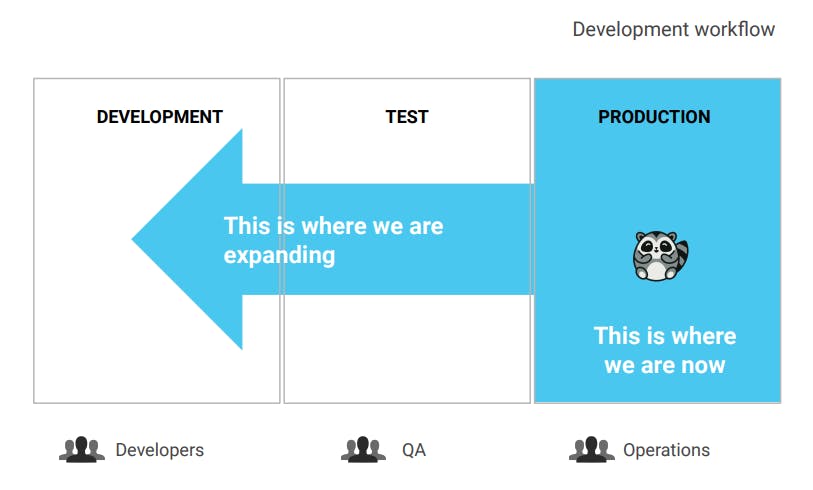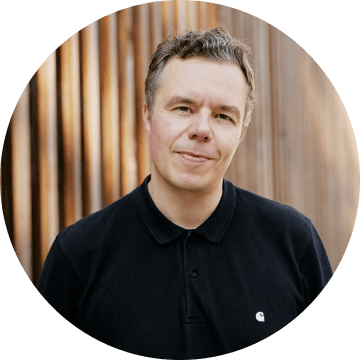We just closed a $2.25M investment round led by Accel and a pack of top rate Angels. Lots to talk about, here's the itinerary:
- The vision.
- Setting goals.
- A timeline of events.
- Random learnings.
- On the investment round.
Onwards!
The vision
Let's start at the end.
Three months ago Checkly was a bootstrapped solo project run by me from a desk in the back of a Berlin fashion label's spare floor space (👋 Frisur!).
Now we are six people on a mission to give active monitoring and E2E testing a very serious kick in the butt. Here is a copy & paste from our pitch deck.
Checkly today is a SaaS platform used by DevOps teams to monitor their APIs and web applications. This is just step one in a much larger vision:
Checkly will be the #1 Active Reliability platform for modern DevOps teams

- Unite the E2E-testing and monitoring workflow
- Serve cross functional DevOps teams
- Use a modern stack based on Javascript & open source
I 100% believe in this. Full stop. But how did we get here? Glad you asked.
Next paragraph!
Setting goals
In August 2019 I made a list of two goals.
- Find co-founder(s).
- Find funding
1. Find co-founder(s)
In August, I just passed 80 or so paying customers. I felt Checkly found its initial product market fit. I had some sweet first larger Enterprise™ customers lined up.
But doing this by myself was just not sustainable. I'm a part time perfectionist, I worry about money. I respond to customer emails and Intercom messages within 3 minutes in the weekends. I have sleepless nights over the visual design of my invoices.
Some of this is totally necessary when starting a business. However, none of this healthy in the long term if you can't share the burden. Ask my doctor.
2. Find funding
Bootstrapping is a very sane strategy to start a company. Especially a SaaS business. Learn to code, get customers. Put in your own cash. I put in about €35k or so. If you don't believe in it, why would anyone else?
However, there are many reasons to take external funding. For Checkly the most important ones are:
- Ambition: I want Checkly to really really make a dent in how developers do monitoring, E2E testing and everything in between.
- Timeliness: I don't want to wait for organic growth to allow me to hire great developers, great marketing, great biz dev. Also, the market won't wait.
There are many secondary benefits: more stability for current customers, fantastic network opportunities etc.
Long story short: Solo is tough.
A timeline of events
First of all: I lied. The fundraising took ~3 months. The whole run up a bit longer.
Anyhooo, this is how things went after making my mind up on co-founders and funding.
2019
August
- Hannes Lenke, then General Manager at Sauce Labs here in Berlin reaches out for "getting to know each other" talks. That's SV speak for early acquisition talks. I almost always go to these things. Good for the network. You never know.
September
- Turns out Hannes is ready for a new challenge. He's "transitioning out" of Sauce Labs. That's SV speak for leaving the company. We talk and decide to research joining forces.
- We go on a "dating period". We both started other companies earlier. We talk to each other's co-founders. We eat lunch. We eat Italian food. Lot's of eating in general.
October
- Some distraction by being invited to interview for the Y Combinator Winter 2020 edition in Paris. A very useful distraction, as it sharpens the mind. I wrote a blog post about it.
😱 October is already a great month for my SaaS Checkly and now I got through to the 10-min interview round at @ycombinator cray cray ! Paris here I come 🥖🍷🚬 pic.twitter.com/EH67Yfb7Hw
— Tim Nolet 👨🏻🚀 (@tim_nolet) October 17, 2019
- Hannes and I decide to go in business together. We shake hands during a breakfast. Effectively this means we create new shares in the company. He also brings some cash.
November
- I talk to Guillermo and his team at ZEIT. He's already a customer and is evangelizing Checkly to anyone who will listen to him. This is of course pretty awesome and makes concrete what Checkly can be in the future. Turns out Guillermo has opinions on E2E testing.
In God we trust, all others must bring e2e tests.
— Guillermo Rauch (@rauchg) August 27, 2019
- Me and Hannes hammer out some contractual details. Money, starting date, ownership, vesting. We start calling and emailing some lawyers. We start thinking of funding a bit more serious.
- I talk to Andrei from Accel again. We talked in July too. These are short, 30 minute conversations. It's a big part of Andrei's job. Also Andrei is terribly smart so it never hurts to have him analyse your company and your market for free.
- Hannes introduces me to a friend and former colleague Timo Euteneuer. Timo is a customer, go-to-market and sales guy. We have Italian food.
December
- 🎁 Sinterklaas.
- 🎅 Christmas.
- 🥂 New Years. We managed to get some oliebollen here in Berlin. Total win.
Nothing really happens which is fine.
2020
January
- We decide to look for a ~$500k Angel funding round. We work on our pitch deck. We start poking some contacts from our network. We get new hair cuts. We do lunches and dinners in and around Berlin. We do Zoom calls. Lots and lots of Zoom calls.
- We decide to hire our first engineers based on the assumption we can raise that round before our little nest pocket money runs out.
- I talk to Timo a bit more. On paper it looks crazy good: three founders with complimentary skills: one engineering/product/design, one general management/corporate, one go-to-market/sales. All very nice guys of course with great hair cuts.
- Some notary and lawyer stuff to get Hannes on board.
February
- I turn 40. It's terrible.
- I decide to add Timo to the founding team. This annoys our lawyers and notaries quite a bit! Panta Rhei / Omnia mutantir / C'est la Vie!
- At this stage we have about five to six VC's inbound per day. Somehow word gets around. We are still on the Angel track.
- We do even more Zoom calls. Pitching over Zoom is hit and miss. Some go great, some are awkward.
- We talk to Accel a bit more. Quite a bit more. We brainstorm together what the world would look like if Accel joined the party. It looks quite exciting.
- We sign a term sheet with Accel.
"But wait! Didn't you just say you were on the Angel track?" Yes, so the Angels join the round. This happens quite a bit.
This gives Checkly a "best of both worlds" round: Accel's experience in the developer SaaS industry through port folio companies like Sentry, Atlassian, Instana and Humio (and many more) together with a list of Angels that are themselves founders, technologists and market experts.
For those who didn't read Venture Deals, a term sheet is a declaration of intention to close a deal under certain terms. It is a very important step, but not the deal itself.
March
- The specifics of the term sheet require some serious (international) legal kung fu also known as Due Diligence. I gladly hand over this process to Hannes who now oversees a small army of legal advisors and notaries spanning most of the Old and New World.
- I start building the team and transforming our development and company infrastructure to something fit for more than one person.
- We rent a small office. We use it for about two weeks.
- Corona hits Germany and the world. We start working from home.
- Tensions rise around the world economy. Tensions rise at Checkly HQ. But it turns out our investors are pretty level headed in the face of these unprecedented events. We are coasting to a closing.
April
- Things are weird. The world is in lock down. Some things take longer than planned because the whole western European and US bureaucracy is dealing with Corona. More email, more Zoom.
- 14 April we officially close the funding round. DocuSign traffic spikes. Money changes hands. Shares are earmarked and distributed. Not really in that order but you get it.
Random learnings
- Technical solo founders are advised to "go out and network". But what does that mean in practice? Talk to investors, talk to potential acquirers, talk to potential 3rd party integrators. Make the time even if you have zero intention to act on it right now.
- The value of "sharpening the saw" was lost on me. Being swamped with work as a solo founder can make you not see the forest through the trees anymore. This can be dangerous for you and your customers. I love mixing metaphors.
- A funding round is never your first goal. Again, your todo list should always look like: "1. get customers. 2. get customers. 3. get customers". There are exemptions. You are probably not the exemption.
- It is normal to talk to a lot of people when raising money. You need to be able to keep a lot of balls in the air at the same time. This makes fundraising a very time and energy intensive process. January and February were extremely slow months product and marketing wise.
- Your deck is never finished, neither is your pitch. You tweak it as you go along.
- Practice your pitch. Say it out loud. Do a role play. It works.
On the round
As mentioned, we raised $2.25M in a round led by Accel. Some really awesome business Angels also joined the round.
Guillermo from Zeit and Mirko from Instana are founders or C-level in our market or very close to it; Christian and Paul (founders at Adjust) and Philip from TinyVC are here in Berlin. A coffee is a short U-bahn ride away. Robin (founder at Mango Capital) was a board advisor to Hashicorp and many more developer tooling companies. I'll just stop there.
What are we going to do with the money?
- Create an awesome development team.
- Create an awesome go to market team.
- Make Checkly the #1 active reliability platform for modern DevOps teams.
Easy! 😅
Onwards!

